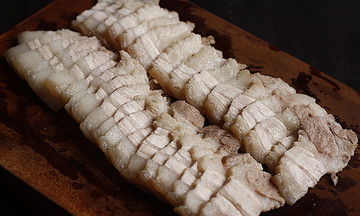Dr. Nguyen Huu Hieu, from the Pediatrics Department of TP HCM General Hospital, said the cause of prolonged vomiting in children can stem from many organs, not just the digestive system. However, the results of Tai's cranial CT scan, electroencephalogram, and abdominal ultrasound did not reveal any abnormalities.
An esophagogastroduodenoscopy showed inflammation and congestion, leading doctors to suspect gastroesophageal reflux disease (GERD). This condition occurs when the esophageal lining becomes inflamed and swollen due to stomach acid and digestive fluids repeatedly irritating the esophagus. The acid reflux causes inflammation, leading to a burning sensation and intense irritation in the esophagus, resulting in uncontrollable vomiting, inability to absorb nutrients, and weight loss.
Tai was treated with proton pump inhibitors (PPIs) to reduce stomach acid production. After 7 days, his vomiting stopped, his health improved, and he was discharged with scheduled follow-up appointments.
 |
Dr. Hieu examines a young patient. Photo illustration: Tam Anh General Hospital |
Dr. Hieu examines a young patient. Photo illustration: Tam Anh General Hospital
GERD in young children is often due to an underdeveloped digestive system, especially a weak lower esophageal sphincter (the one-way valve between the esophagus and stomach). This is a physiological phenomenon in many children and improves as they grow older. In older children, the main causes are a diet high in spicy, hot, oily foods, highly acidic foods (oranges, lemons), chocolate, carbonated drinks, lying down immediately after eating, overeating, and being overweight. Some children with asthma, hiatal hernias, or neuromuscular problems are also at higher risk of GERD.
Esophagitis in older children is often a sign of prolonged GERD. Children are also more prone to reflux if they have poor eating and lifestyle habits or are overweight. The symptoms can vary depending on age. Young children often spit up after feeding, are fussy, refuse to feed, have slow weight gain, and a persistent dry cough or wheezing. They may also experience recurrent ear infections, rhinitis, and pneumonia. Older children may experience heartburn, acid reflux, a burning sensation in the chest that spreads to the neck, chest pain, difficulty swallowing, nausea or vomiting, coughing, hoarseness, a sour taste in the mouth, and bad breath.
Treatment for esophagitis in children focuses on reducing reflux, healing inflammation, and preventing complications. Children need to adopt healthy lifestyle and dietary changes and maintain a healthy weight.
Dinh Lam
*The patient's name has been changed.
| Readers can submit questions about children's health here for doctors to answer. |












